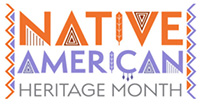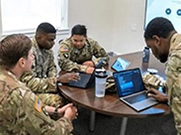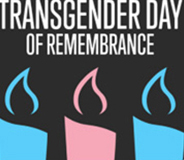
The CHBS Canopy is our college’s newsletter that highlights inclusive excellence efforts within the college, provides insights into issues of inclusion and diversity, and shares learning opportunities on campus and in the region.
CHBS Highlights
Speaking of Social Impact
Social impact is characterized by the positive effect on communities or their people from an action, activity, or policy on communities or their people. Affirmative change should be a direct, measurable result of the action. The JMU Physician Assistant Student Society (PASS), a student-run organization of Physician Assistant Studies students, received an IMPACT grant from the PA Foundation to support the Suitcase Clinic, a homeless healthcare initiative dedicated to improving the health of the local homeless population.
According to the National Alliance to End Homelessness, “A record-high 653,104 people (USA estimate) experienced homelessness on a single night in January 2023. This is more than a 12.1 percent increase over the previous year.” It is difficult to get an exact count of individuals and families who may be unhoused due to the ways this population engages in survival processes, such as sharing a space with a family or friend, sleeping where they will not be detected, or sleeping in their cars. There are two linked measures, the Point-in-time count (PIT) and the Continuum of Care (CoC) count formerly completed by the Harrisonburg Redevelopment and Housing Authority. There is no way to have an exact number of unhoused or homeless people in any community. What is easier to say about the local unhoused population is that they represent multiple identities, family configurations, and low or working-class incomes. They are veterans and individuals who have fallen on hard times due to the connections between employment and housing. They become invisible and unwanted in our public spaces.
The Suitcase Clinic serves individuals with no bed of their own, regardless of insurance status. It meets the needs of the unhoused, especially those with chronic health conditions requiring maintenance care without an established relationship with a healthcare provider. After finding housing, the clinic provides continuity of care for up to 24 months.
The social impact of raising resources for the Suitcase Clinic to provide care is a significant PASS contribution
Celebrating National Native American Heritage Month
In 1907, the first U.S. Senators of Native American descent elected to office were Charles Curtis, a Kaw chief descendent of Kansas, and Robert Owen, a member of the Oklahoma Cherokee Nation. In 1990, Congress passed and President George H. W. Bush signed a law designating the month of November as the first National American Indian Heritage Month (also known as Native American Indian Month). Native People have different sensitivity to how external people address their identity. If known, a preference is to be called by their specific nation or tribal name, and these are always capitalized in writing.
The U.S. Department of Defense provided this short video about this year’s observance. The U.S. Department of Health and Human Services, in coordination with the White House Council on Native American Affairs, is hosting the 2nd Annual Traditional Healing Summit on November 18-19, 2024, in Washington, DC.
Virginia government acknowledges this month –
Indians have lived in what is now called Virginia for thousands of years. We are still learning about these people, but Virginia history clearly did not begin in 1607. If you ask any Virginia Indian, "When did you come to this land?," he or she will tell you, "We have always been here."

How can we observe this month?
- Learn about Virginia-recognized Tribes, acknowledging that not all who once existed on this land known as Virginia are legally recognized by the federal or state governments. On December 20, 2019, the Little Shell Tribe of Chippewa Indians of Montana became the 574th tribe to gain federal recognition. Virginia recognized the Pamunkey Tribe in 2015. In 2018, the federal government recognized six additional Virginia tribes, including the Chickahominy, Chickahominy Eastern Division, Monacan, Nansemond, Rappahannock, and Upper Mattaponi.
- The Monacans lived between the Roanoke River Valley and the Potomac River. They use Natural Bridge State Park to display their culture. Visit this site.
- Read about the Monacan history.
- Visit one of the two Smithsonian National Museums of the American Indian, one in Washington, D.C., or in New York City.
- Embed relevant content about Indigenous People and their contributions into your course materials.
- Do you use any of the 10 Native American Inventions Commonly Used Today? Consider their impact on your life.
- Acknowledge, appreciate, and take action steps to uplift Indigenous knowledge, history, and culture.
What's in this issue?
PASS Social Impact
Professors Featured
Native American Month
National Veterans Day
World Kindness Day
Transgender
Student’s Stress
Events
World Kindness Day 2024
November 13, 2024
A global celebration that promotes the importance of kindness to each other, to yourself, and to the world. The focus is on communicating “I am enough” and promoting social-emotional learning (SEL) skills.
Two CHBS Professors Featured
Two CHBS professors were featured in stories on the JMU News page in October.

CHBS Health Sciences professor Sojib Zaman has been listed for a third consecutive year in Stanford/Elsevier’s Top 2% Scientist rankings. He has authored, co-authored, or edited more than 100 peer-reviewed papers, with more than 65,000 career citations. Read the JMU News article.

Psychology professor Ben Blankenship provided helpful tips for coping with the election, such as limiting media exposure or focusing on one’s health and well-being. Even though the election is over, some may continue to experience stress. Read the JMU News article.
Veterans and Military-Connected Students

November is National Veterans and Military Families Month, established in 1996 to acknowledge the sacrifices military families make in contributing to society's safety. On Monday, November 11, remember to thank veterans (and their families) for their service, especially on Veteran’s Day and every day.
Based on enrollment data from the National Postsecondary Student Aid Survey (NPSAS), academic year 2019-20, 3.7% of undergraduates were veterans, with the greater percentage choosing to attend for-profit colleges and two-year institutions. Slightly more veterans chose minority-serving institutions (MSI), and a higher percentage of Black veterans selected the HBCU academic experience. Sixty-three percent of veteran students were age 30 or older. Veteran students represented many heritages, including Native American, Asian, Latino, Black or African American, and Native Hawaiian/Pacific Islander.
Many veteran students or their children are able to attend college through programs like the Post-9/11 GI Bill Financial Benefits, the Department of Defense tuition assistance program, Title IV, financial aid, or Pell Grants. Despite these supports, not all veterans are able to seek post-secondary college education. By 2017, only one percent of college graduates were identified as veterans. Those veterans illustrate the value of a college education with initial graduate salaries slightly above the average matriculated student. Other indicators of improved life outcomes are nearly 74% were homeowners, and 87% had retirement accounts.
Faculty can support military-connected students by recognizing that military service is often a family experience involving reoccurring deployments and reintegration processes. Faculty can provide flexibility, out-of-class academic support, and resources such as the Student Support Hub or JMU Valor. We are also asked to check our bias related to military service. Not every person who served has PTSD, trauma experiences, deals with flashbacks, or has mental health concerns as often depicted in movies or media. To foster a sense of belonging, meet each veteran or military-connected student as they represent, be sensitive, and address concerns they bring. Get to know them as people and learn that military service is one part of their lived experience that can vary among individuals. Assist veterans and military-connected students to seek career paths and support networking.


The JMU Valor Program, located in Taylor Hall, serves all military-connected students, faculty, staff, and community members. JMU is considered a Military-Friendly School that provides support and resources. Networking activities occur weekly, and you may contact Monica Pangle at jmuvalor@jmu.edu to learn more.
Transgender Harm
“Trans” is an umbrella term for people whose gender identity differs from the sex assigned to them at birth. Throughout recorded history, people who fit this definition have existed in every culture. “Gender expansive” is an umbrella term that describes people whose gender identity, expression, or experience doesn't align with societal gender norms or the sex they were assigned at birth.
Other cultures have differing beliefs about gender, not built on dichotomous binary gender identity. For instance, in the Samoan culture, a Faʻafafine, loosely translated as “in the manner of a woman,” is born with male genitals and aligns with a third gender identity. Samoan culture has four gender identities: female, male, and faʻafafine and fa'afatama, who move between male and female gender identities. This is one example of many similar cultures around the world.
In some parts of the world, gender identity variations are accepted and have a role in society. For those who are trans or gender-expansive, identity, stigma, bias, violence, and hate crimes frequently accompany the lived experiences. The Human Rights Campaign (HRC) acknowledges twenty-seven individuals who lost their lives due to anti-trans violence in 2024. Seventy-four percent of the victims were people of color, with 48% being Black trans women and 63% being killed by guns. The bodies of many of those killed exhibit brutality and trauma beyond necessary for death. Trans-identified people of color often endure harsh violence even if they survive the assaults. The process of defining hate crimes results in the underreporting of incidents, as does fear of a lack of supportive responses from authorities or law enforcement. HRC shares brief stories of victims; here are examples:

- Pauly Likens, a 14-year-old transgender girl, was found dead in Sharon, Pennsylvania. Her dismembered body was found in the Shenango River Lake, a reservoir in western Pennsylvania.
- Brandon "Tayy Dior" Thomas, a 17-year-old Black transgender girl in Mobile, Alabama, was killed by her romantic partner.
- 20-year-old Dylan Gurley, a transgender woman from Little Elm, Texas, was killed in Denton, Texas. She was found unconscious with multiple stab wounds by police and was subsequently declared dead at a local hospital less than an hour later.
- Vanity Williams, a 34-year-old Black transgender woman, was an Air Force veteran who had recently begun nursing school. She was killed in her Atlanta apartment lobby.
Each victim or survivor of trans-targeted violence has families and friends who love them. Attend the Trans Remembrance Day observance sponsored by SOGIE on November 20, 6:30 p.m. in Warren 256 as part of Trans Awareness Week.
Helping Students Manage Stress
As students enter the second half of the semester, some will experience greater stress as they worry about final grades, missed assignments or class attendance, roommate relationships, family, and economics. Such stress can limit their academic success. However, stress is not a negative experience for all. For some, it can motivate them to act, like completing assignments or seeking assistance.
When experiencing stress, students may find themselves more isolated or engaged in isolating behaviors. Student stress comes into the classroom whether we recognize it or not. Here are some reminders –
- Stress looks different for every person. Therefore, you may not be able to spot specific stress behaviors.
- Students may disappear from class without excuse, request mental health days, or ask classmates to cover their absence.
- If you think someone is experiencing worry or stress, invite them to your office hours for a non-threatening conversation.
- Take a few minutes before class starts to solicit questions, provide reviews, or highlight difficult course content.
- Embed stress reduction techniques into class time such as mindfulness, deep breathing, visualization, or physical movement.
- Encourage basic health promotion like getting rest, eating well, or spending positive time with friends.
For students who need greater support, remember these resources:
If staff or faculty are experiencing stress – Check out the Employee Assistance Benefit
|
Events . . . Events . . . Events . . . Events . . .
|
|---|
|
Leona Sevick, Guest Reading
|
|
History of Palestine/Israel |
|
Faculty/Staff Wellness – Sound Bathing
|
|
Deep Impact: Trans Awareness
|
|
German Film Festival |
|
Refugee Thanksgiving Meal |
|
Transgender Day of Remembrance Open House
|
|
Candlelight Vigil: Transgender Day of Remembrance
|
|
Indigenous Peoples event & NAIWG |
|
2025 MLK Keynote Speaker: Chamique Holdsclaw |
|
Freedom of Expression Series Session 3: Freedom of Expression in Personal Safety - Campus Safety in Response To Weapons |


